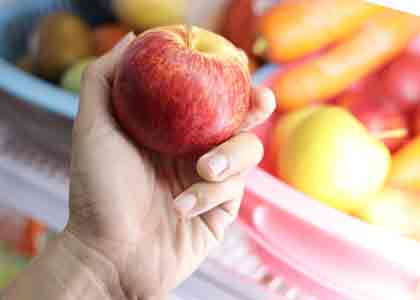
How to Store Your Fall Produce
By Claire Georgiou, Reboot Naturopath, B.HSc ND
As the weather cools down in the USA and around the world, you get to enjoy a different variety of fall fruits and vegetables such as pumpkins, apples, pears, sweet potatoes, winter squash, grapes, cauliflower, beets, broccoli and more. Take advantage of this bounty, and stock up! But of course, make sure that you’re following good storage strategies to retain your produce’s nutrients and taste for as long as possible — there’s nothing worse than throwing away good food because it spoiled.
Here are some tips so you can get the most out of your produce in the fall.
Apples
Store apples in the fridge’s fruit and vegetable crisper to help them last longer. If your fridge doesn’t offer humidity control, place a slightly damp tea towel or paper towel in the drawer to extend their freshness longer. Apples store well frozen in pieces for stews, sauces and smoothies.
Note: Damaged or spoilt fruit can make other produce spoil faster, so inspect apples carefully before putting them away.
Try this recipe: Easy Homemade Applesauce
Pears
Keep pears at room temperature until they ripen. Then, put them in the crisper to help them retain their freshness for longer. You can also slice them up and store them in freezer bags or containers if you want to use them beyond one week after ripening.
Try this recipe: Grilled Pear Walnut Salad
Figs
These are my absolute favorite fruit. Store figs on a plate in the fridge once they have ripened wrapped up in a paper towel or in an air-tight container. They’ll be able to last for a week this way. Or, chop them up and freeze them for use in smoothies or other recipes later on.
Try this recipe: Fiber-Rich Fig Smoothie (With Lots of Greens!)
Grapes
These are best kept in a bag with holes so the grapes can breath. A paper bag enables some ventilation. Remove any spoiled or damaged grapes. Grapes freeze very well and are delicious as a frozen snack.
Try this recipe: Red Antioxidant Power Smoothie
Pomegranates
These can be stored in the fridge for up to three months. Store them in an airtight container to retain their freshness and flavor.
Try this recipe: Avocado, Pomegranate & Pine Nut Salad
Avocados
Avocados can be kept in a dark cool place until they are ripe. Then, store them in the refrigerator to slow down the ripening process.
Try this recipe: Anti-Aging Avocado and Parsnip Salad
Fresh Dates
Store them in an airtight container in the fridge or a cool cupboard.
Try this recipe: Cocobeet’s Blue Coconut Smoothie Recipes
Pumpkin
Pumpkins can last up to three months if stored correctly. Store them in a cool, dry and dark location, such as the pantry or kitchen cabinets.
Try this recipe: Baked Truffle Pumpkin Mashed Potatoes
Sweet Potatoes
Much like pumpkins, sweet potatoes are best stored in a dry, cool and dark place like a cupboard. Make sure to keep them away from strongly odored vegetables (like onions and garlic). I tend to put sweet potatoes in a basket with holes in dark cupboards that I don’t go to all the time.
Try this recipe: Sweet Potato Fudge Brownies
Butternut Squash (Winter Squash)
These are best stored like pumpkin and sweet potatoes — keep them in a cool, dark and dry place. These can last for 3-6 months.
Try this recipe: Creamy, Non-Dairy Butternut Squash Soup
Cauliflower
Store in a bag with holes for ventilation and with paper towel in the fridge to increase their life expectancy of one to two weeks.
Try this recipe: Baked Cauli-Turmeric Poppers
Beets
Store beets in a bag in the fruit and vegetable crisper so they can last for up to three weeks. They also last longer when the tops are cut off — leaving green tops on leads to increased moisture loss by drawing moisture away from the beets.
Try this recipe: Beet & Red Cabbage Slaw with Garlic Aioli
Broccoli
Store broccoli wrapped in damp paper towels to increase its freshness in the fridge.
Try this recipe: Chopped Broccoli Salad with Roasted Garlic Aioli
Cabbage
Store cabbage in a bag in the fridge. It will last up to two months — just remember to remove any leaves that are wilted or damaged.
Try this recipe: Green Cabbage Tummy Soother
Carrots
Store them in the vegetable crisper with a damp towel or an air-tight container with a slightly damp towel to increase their life expectancy. Immerse your carrots in water to really extend their life. Cut off tops if needed.
Try this recipe: Coconut Carrot Cake Protein Balls
Brussels sprouts
Store in plastic bags with some holes for ventilation or a paper or mesh bag.
Try this recipe: Brussel Sprout Chips
Many storage tips suggest using plastic bags. I personally love using healthier alternatives such as glass containers for fruits and vegetables, putting produce in the fruit and vegetable crisper with a slightly damp tea towel laid over the top or using mesh material or paper bags where ventilation is needed. You can buy specific produce refrigerator glass containers along with environmental produce bags.